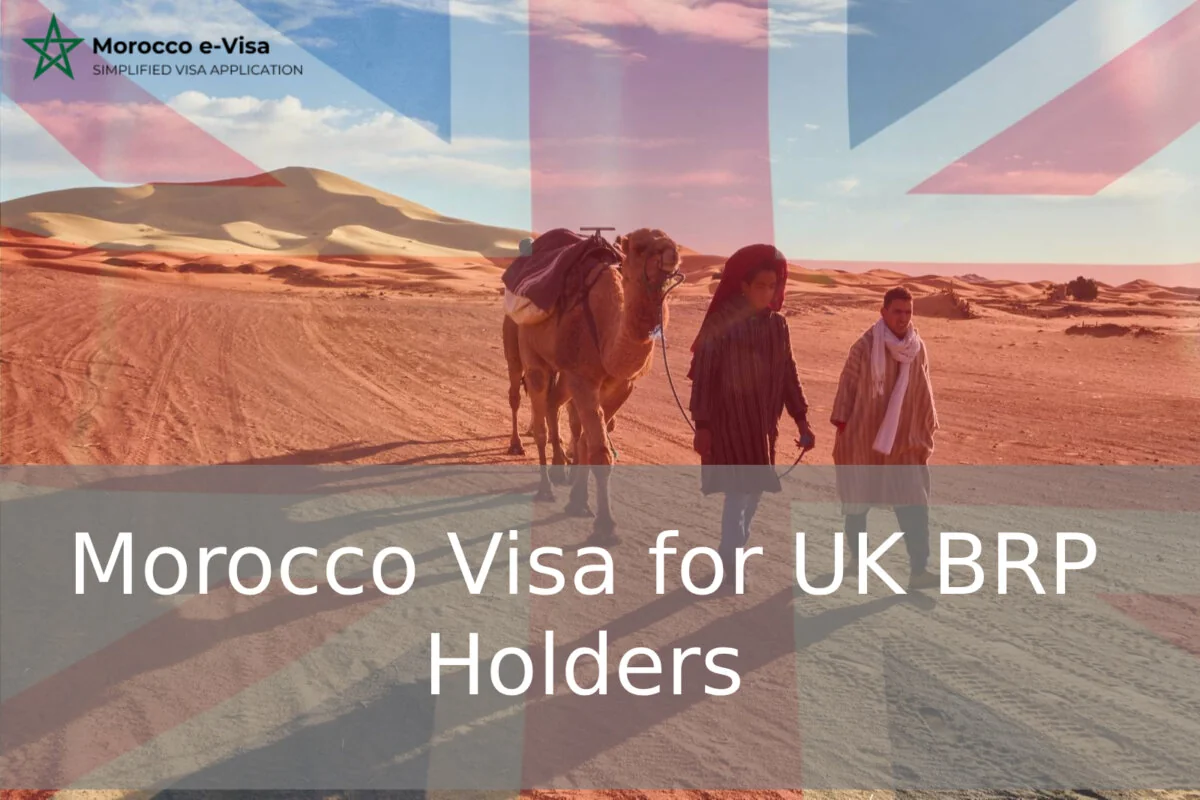
UK BRP holders do need a visa to enter Morocco in 2026.
Unlike UK citizens, BRP holders must apply for a visa to enter Morocco.
This applies whether you’re visiting for tourism, business, or other purposes.
NOTE: Don’t assume your UK residence status exempts you from visa requirements.
Visa Requirements Comparison
| Category | UK Citizens | UK BRP Holders (Non-UK Nationals) |
|---|---|---|
| Visa Needed for Morocco? | ❌ No, visa-free for up to 90 days | ✅ Yes, visa required |
| Stay Limit Without Visa | 90 days | Not applicable |
| Application Type | None required | e-Visa or consulate visa |
| Based On | Citizenship | Nationality (not BRP) |
| Required Documents | Passport only | Passport + BRP + accommodation + funds + itinerary |
The visa application process requires submitting various documents, including a completed application form, passport-sized photos, a valid passport, and proof of UK residency.
Applicants must also provide an itinerary and proof of accommodation in Morocco.
Applying well before your planned travel dates is advisable, as processing times may vary.
In this 2026 guide, we’ll guide you through everything you need to know about obtaining a Morocco visa as a UK BRP holder.
Important: Holding a BRP does not grant the same travel rights as UK citizens. Morocco treats BRP holders according to their nationality, not their UK residency status.
Understanding Morocco Visa for UK BRP Holders
Before we dive into the specifics, let’s clarify what a UK BRP holder is.
A Biometric Residence Permit (BRP) is issued to non-UK citizens who have been granted permission to stay, work, or study in the UK.
If you hold a BRP, your travel documents and requirements may differ from those of British citizens.
NOTE: Understanding your status is crucial for travel planning.
Passport Validity and Documentation Needed for Morocco Visa with BRP
Required Documents for Morocco Visa (UK BRP Holders, 2026)
| Document | Required | Notes |
|---|---|---|
| Passport (valid +6 months) | ✅ | Must have at least 1 blank page |
| BRP Card | ✅ | Proof of legal residency in the UK |
| e-Visa Application Form | ✅ | Submit via acces-maroc.ma |
| Passport Photos | ✅ | White background, recent |
| Accommodation Proof | ✅ | Hotel booking or invitation letter |
| Travel Itinerary | ✅ | Flights + planned trip details |
| Proof of Funds | ✅ | Bank statements/payslips |
| Return or Onward Ticket | ✅ | Must prove departure from Morocco |
As a UK BRP holder applying for a Moroccan visa, it’s essential to ensure that your passport is valid for at least six months beyond your intended stay.
This is a non-negotiable requirement and is crucial to preventing processing delays.
In addition to passport validity, you will need to gather several vital documents for your visa application in 2026:
- Completed Visa Application Form on the official website in.diplomatie.ma: Fill out the form accurately and completely. Double-check to ensure all information is correct to avoid complications.
- Two Recent Passport-Sized Photographs: Ensure these meet current Moroccan specifications, typically a white background and a clear, full-face image.
- Valid Passport: Your passport must have at least one blank page for the visa stamp.
- Proof of UK Residency: Your valid BRP card is the primary document required.
- Proof of Accommodation in Morocco: This can be confirmed by hotel bookings or a formal invitation letter from a host.
- Travel Itinerary: Details of your travel plans, including flight reservations and planned activities.
- Proof of Financial Means: Recent bank statements or payslips showing you can support yourself during your stay.
- Return or Onward Travel Tickets: Confirmed bookings that show your plan to exit Morocco after your visit.
Checking the latest requirements with the Moroccan consulate or embassy in the UK is recommended, as regulations can change.
NOTE: Preparing these documents meticulously will help ensure a smoother visa application process.
Applying for a Visa: Process and Necessary Documents
The process for applying for a Moroccan visa in 2026 typically involves the following steps:
- Complete the e-visa application form on the official Moroccan government portal.
- Upload digital copies of your passport, photos, and supporting documents.
- Pay the visa application fee online.
- Wait for processing. You may be asked to submit your physical passport to the consulate for stamping once approved.
NOTE:The shift to e-visas has streamlined the process, but it’s still time-consuming. My application was approved within three weeks, but I made sure every document was perfectly clear and accurate.
In my case, I experienced the process to be straightforward but time-consuming.
My visa was approved within three weeks, but I had to ensure all documents were accurate and complete.
Common Reasons for Visa Rejections and How to Avoid Them
Common Visa Rejection Reasons (2025) & How to Avoid Them
| Reason | Why It Happens | How to Avoid It |
|---|---|---|
| Incomplete application | Missing fields or incorrect data | Double-check all sections before submitting |
| Insufficient funds | Bank statements don’t show stability | Provide 3 months of statements |
| Weak travel purpose | No itinerary or unclear visit intention | Attach clear travel schedule |
| Invalid photos | Wrong format or old photos | Follow Moroccan photo requirements |
| Damaged passport | Tear, stains, or invalidity | Renew passport before applying |
Visa rejections can be disheartening, but they’re often avoidable.
NOTE: Double-check each requirement and document before submission.
Ensure all forms are completed to avoid rejection and provide comprehensive supporting documentation.
I used a checklist to keep track of everything, which made the process smoother.
Resources for Further Assistance
Contacting the Moroccan Consulate General in the UK is your best bet for further assistance.
They can provide up-to-date information and answer specific questions about your visa application.
NOTE: Official sources are the most reliable for visa-related queries.
Conclusion
Understanding the 2026 visa requirements and processes for UK BRP holders traveling to Morocco can seem daunting, but it’s manageable with the correct information.
Whether you’re planning a short trip or a long stay, being well-prepared will ensure a smooth and enjoyable experience.
Make sure to gather all necessary documents, follow application guidelines meticulously, and seek official assistance if needed.
FAQ Section
Do UK BRP holders need a visa to enter Morocco in 2026?
Yes, UK BRP holders do need a visa to enter Morocco. Unlike UK citizens, BRP holders must go through the visa application process.
How long can UK citizens stay in Morocco without a visa?
UK citizens can stay in Morocco without a visa for up to 90 days for tourism purposes. For more extended stays or other activities, a visa is required.
What documents are needed for a Moroccan visa application?
You’ll need a valid passport, proof of sufficient funds, onward/return tickets, accommodation details, and documents proving the purpose of your trip.
How far in advance should I apply for a Moroccan visa?
Applying for a Moroccan visa 1-2 months before your travel date is recommended to ensure timely processing.
What should I do if my visa application is rejected?
If your visa application is rejected, carefully review the reasons provided, correct any issues, and consider reapplying. Contact the Moroccan Consulate General for guidance.
Can I extend my stay in Morocco beyond 90 days without a visa?
Visa holders may request an extension at a Moroccan police station, but approval is not guaranteed.
